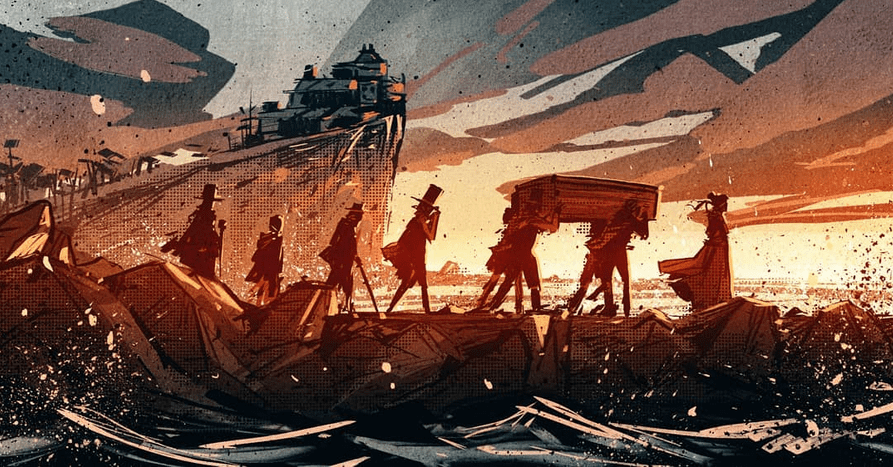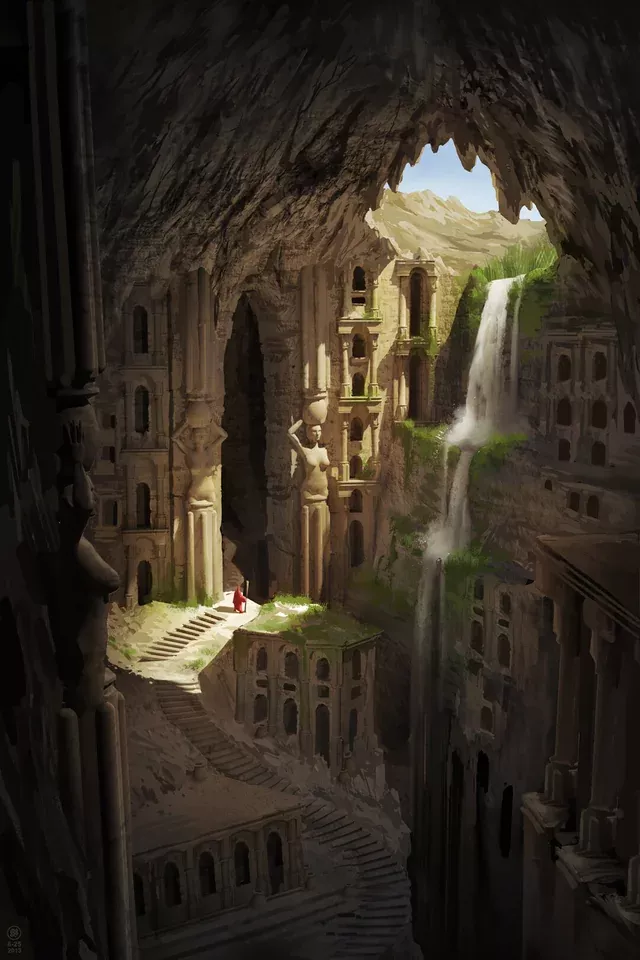Mortuary rituals
How do people honor and grieve their dead in my world ?
Among the Primordials (Genesis/ La Genèse)
Death in Genesis is not really considered a death, since it is an animistic religion. The soul is considered to survive after the death of the body.
The death of a Primordial therefore gives rise to a ceremony, not to honor the memory of the deceased or mourn him, but to celebrate his accession to a different degree of existence and to establish contact with his spirit.
Thus, when someone dies, it's common to gather a sample of each of the 4 major elements: water, fire, air or wind, and earth. The fragments used may vary, but a candle for fire, stones or plants for earth, smoke for air and drops from a rain shower for water are common. These samples are placed around the corpse to form a square around the body. In this way, the spirit of the deceased individual remains linked to the main elements and to primordial spirituality. A ceremony is then held in honor of the deceased, during which all those who have been involved in the person's life come together to pray, dance, play music and celebrate the person's life, but also his/her new belonging to another way of being. The celebration ends with the destruction of the body. To achieve this, all 4 elements must be involved, so that the person's envelope becomes impregnated with them. The body is coated with a thin layer of water, then covered with flowers. Finally, it is set ablaze. All 4 elements are thus involved (water, earth with flowers, fire, and air, as combustion produces smoke).
Among the Augustans (L'Axe/ The Axis)
Among the Axis believers, death is not really seen as something negative.
In this religion, the dead are not considered to be destined for any particular destination. The soul remains in the body. In reality, the person remains as he or she is, and perceives only darkness. It is the One God himself who “visits” the dead. He will then address the mortal, asking if he has fulfilled his deepest desire. If this is the case, then God will acknowledge the person's death, sending him or her to the Void. If not, God will grant the wish or not, depending on the life the person has led.
Thus, there are no funeral rites. The Augustans consider the moment between death and entry into the Void to be sacred, so they don't profane it. After four days (bodies don't decompose like they do in our world), the corpse is taken away, but no one knows where.
Among the Faussians (Le Faisceau/ The Beam)
The Beam takes a similar approach to Death as Greco-Roman mythology.
The pantheon of this religion includes 3 Gods of death :
- Tehor, the God of Blissful Death (for most mortals, those who have led a normal life and have not committed any major faults)
- Serreth, the God of Desolation (for those who have been seriously wrong)
- Upsir, the God of Salvation (for those who have led a faultless life beyond good behavior)
The funeral ritual comprises several stages. First, tradition dictates that an offering be made to each of the 3 gods: one to Serreth to ask for his mercy, one to Tehor in the forme of a request, and one to Upsir which is intended to praise him in order to obtain his graces. Then, the body is stripped as a sign of humility towards the Gods, and a mask is placed over the person's face. This mask is divided into 3 sections, symbolizing the 3 Gods and thus the 3 possibilities for the deceased. Once this ritual has been completed, no one may enter the room where the deceased lies. This remains the case until one of the 3 Gods takes the body away. Once the body has evaporated from tangible reality, it is usual to gather in the room to mourn the deceased. An offering is then made to the God who has chosen the defunct. If that god is Serreth, then the purpose of the offering is to implore his clemency, while for Upsir or Tehor, it is to thank him or praise his goodness. It is possible for the family or loved ones to know which god to submit the offering to, as when a god is assigned a deceased person, he leaves a sign proving his identity to mortals (a flower for Tehor, a crown for Upsir and a heap of ashes for Serreth). On each anniversary of the individual's death, an offering is dedicated to the God involved, to thank him or to seek his indulgence.
Among the Inherents (La Toile/ The Web)
Among The Web believers, the notion of death doesn't really exist.
When someone dies, he merely leaves his bodily envelope. The psyche lives on in a new life. An Inherent has a cycle of 1,000 and one lives, each different from the next. Memory remains intact at each change of life, so an Inherent remembers all its lives. When an Inherent “dies” (i.e. changes life and leaves his corporeal envelope), his body is preserved in a sanctuary containing all the corpses of The Web. At the end of his 1,000th life, an individual can review all his past lives and choose one. He will then live that life and, like an ordinary mortal, die at the end of it. This will be the true end of his life.
When an Inherent dies, no special rituals are performed, except for his last life. In this case, it's common to light 1,000 candles and let them all burn until they consume. Relatives also recite prayers to ask the Gods to give the deceased a decent welcome.




This is very good!!! I like the variety we see here, the idea that there are very distinct cultural differences along, from how this reads, religious faith for the most part, and how they view death, say farewell to their dead. The most uniquely interesting bit however is that fact that these belief systems have a very real presence in your world, as seen with those of the Web, for example. That is very clearly not merely a belief or faith, they can in fact bear witness to the events and the psyche remembers its previous existences. That would be a unique and interesting group to learn far more about, as such a thing is an interesting thought experiment. How would this alter their views of risk/reward? Would such a group or culture have any belief of anything such as 'soulmates'? How would they view someone who has done something terrible, but for the second or third lifetime in a row? Do such peoples even exist in such a culture? What value do they place on a life, how do they view the concept of murder? Given unless the victim is losing their 1001st life, one could argue the value of it is lower than we would perceive in taking a life. Do simple things like names carry over between lives? Or are they added to? That part in particular, Among the Inherents, is a wonderful tease and thought experiment, and could be a great inspiration for many future articles. I for one would love to know a lot more about that group/society/culture, for such a thing would likely make them far different from ourselves. Well written, a lovely read! I will note for you that under Among the Primordials, your very last line, the word there says consumption, which normally is associated with eating, for food and such. Now perhaps that is tied to the beliefs of that group, that's how they perceive what is happening. However in reading the line a few times, it reads as if the word you may have been looking for was 'combustion' which means to ignite/burn something, and that process generally does produce smoke.
Thank you so so much for your comment Keon ! That makes me very happy, and it's very encouraging ! I'll do my best to answer all these questions in other articles and expand on them :) That's indeed the word 'combustion' I was looking for, thank you very much for the tip !